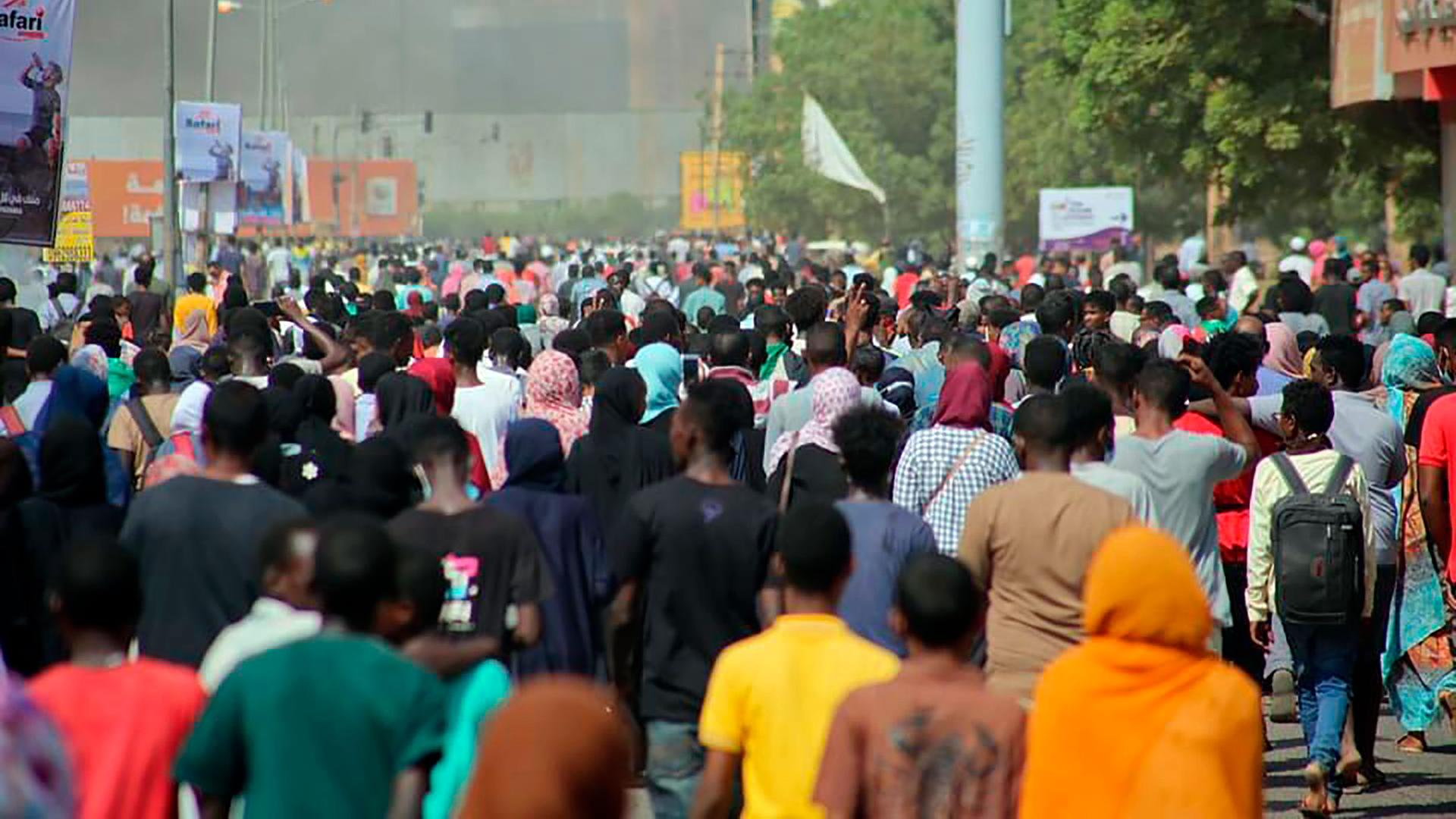Across Sudan, people have taken to the streets to protest a military coup that threatens their hopes for a democratic future.
For two years, the country has been run by a tense and volatile power-sharing agreement between civilian and military leaders that was established after former dictator Omar al-Bashir was ousted from power.
Tensions came to a critical point on Monday when armed forces detained Prime Minister Abdalla Hamdok, Cabinet Affairs Minister Khalid Omer Yousif and other top civilian leaders.
Related: After the revolution, a secular Sudan?
“We still don’t know any news about the whereabouts of the prime minister, his wife, five of the ministers and a number of political leaders who were arrested in the early hours of this morning,” said Yousif’s adviser, Abdelmoniem el-Jack, over the phone from Khartoum.
Jack, who is currently in hiding, said the military takeover was driven by three contested issues with the civilian leaders: unification of armed forces, reclaiming of economic resources controlled by the military, and justice for victims of violence during the 2019 revolution and the genocide in Darfur.
Related: Sudan’s troubled attempt at education reform
In a national TV address on Monday, Gen. Abdul-Fattah al-Burhan, who chaired the Sovereign Council, announced they were dissolving the government and declared a state of emergency.
“Usually, when a coup happens in Sudanese history, they always come like this. … They say given the economic situation, [the] political insecurity that’s happening, we’ve decided to take over the reins of power.””
“Usually, when a coup happens in Sudanese history, they always come like this,” observed Jihad Mashamoun, a Sudanese political analyst based in the United Kingdom.
“They say given the economic situation, [the] political insecurity that’s happening, we’ve decided to take over the reins of power.”
Indeed, Sudan has been in a near-constant political and economic crisis since the 2019 revolution.
The civilian-led government has been largely unable to address the high prices of basic goods, high unemployment and ongoing political instability in parts of the country.
Related: After the revolution, Sudanese women ask what’s next?
“This has all been rather carefully constructed by the military who have sought to portray the government as unable to do the job of responding to the needs of the Sudanese population and have used that as a pretext now to take control of Sudan’s fragile transition.”
“This has all been rather carefully constructed by the military who have sought to portray the government as unable to do the job of responding to the needs of the Sudanese population and have used that as a pretext now to take control of Sudan’s fragile transition,” said Jonas Horner, senior Sudan analyst at the International Crisis Group.
But the military appears to have made a major miscalculation about how the people would respond to them taking over power.
“They did not anticipate that people would go out and protest,” Mashamoun said. “They anticipated that the people would just be calm because they got tired of the economic crisis.”
Instead, the opposite has been true. The resounding support for civilian leadership has been on display on the streets of Khartoum as peaceful protesters marched outside the army headquarters.
“All the streets were blocked by stones and people refusing this thing from the military and refusing to be governed by the military people.”
“All the streets were blocked by stones and people refusing this thing from the military and refusing to be governed by the military people,” said demonstrator Aymen Sayeed over the phone from Khartoum.
“Give the power back to the people,” he added via text message to The World after the phone connection disconnected.
While the internet and telecommunication services have largely been cut off, trickles of information have come through on social media, shedding light on the scale of civilian mobilization but also the deadly response by armed forces.
In a social media post, the Central Committee of Sudanese Doctors said at least three people had died and more than 80 people had been injured.
Jack, the government adviser, says the international community must act against the leaders of the military coup.
“There is a need for whole isolation from the international and regional community against General Burhan, General Hemeti, and all those who are involved in this coup.”
“There is a need for whole isolation from the international and regional community against Gen. Burhan, Gen. [Mohamed Hamdan Dagalo] Hemeti, and all those who are involved in this coup,” said Jack, who called on the United Nations Security Council to sanction the leaders and for the African Union to suspend Sudan’s membership.
In light of the coup, the United States said it was pausing $700 million in emergency economic support for Sudan that was meant to support the country’s democratic transition.
